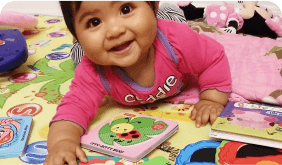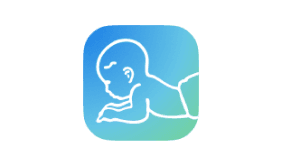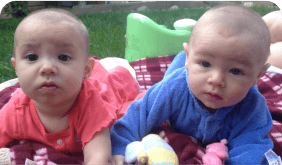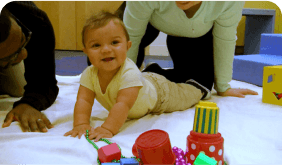You can expect Baby’s first word to appear around their first birthday, and anything from a simplified word to a silly sound effect can count!
Classic first words include “mama”, “dada”, “dog” and “no“.
Simple strategies like narrating daily routines, reading, and responding to Baby’s sounds help support early language development.
When Baby’s sweet babbles turn into actual words, they unlock a whole new way to communicate with you! As you wait for that exciting moment, you might find yourself wondering: “What will Baby’s first word be?”
While “Mama” and “Dada” are usually top contenders, sometimes, Baby’s first word might not be what you think. Let’s talk about it!

When to Expect Baby’s First Word
A baby’s first word typically pops up around their first birthday (just in time for cake and chatter!). By then, Baby will also be able to imitate speech sounds and their babbles will sound more like real conversation—complete with rhythm, tone, and even a little sass.
What counts as a baby’s first word?
If Baby says “dah” instead of “dog,” does it still count? What about a happy little “wee” as you push them in a shopping cart?
Good news: lots of things count as a first word! Even partial or simplified words like “nana” (banana) or “bah bah” (bottle) make the cut. These are called word approximations, and many speech-language pathologists count them as first words. Here’s why:
It takes a while for Baby to get the hang of using all the different parts of their mouth—like the lips, tongue, and palate—to shape sounds, so some are easier to pronounce than others in the beginning (such as “m”, “n”, or “b”).
As their mouth muscles develop, Baby’s pronunciation gets clearer and the amount of sounds they can make increases—but that doesn’t stop Baby from trying to use words they can’t fully say yet! Word approximations are Baby’s way of saying, “I know what I want to say, I’m just working on the delivery!”
Other things that count as first words:
Names: ”Mama”, “Dada”, “Gama”, Baby’s own name
Animal Sounds: “woof”, “baa”, “moo”
Exclamations: ”woo!”, “woah!”, “uh-oh!”
Sound Effects: ”beep”, “boom”, “vroom”
Signs: American Sign Language (ASL) or baby signs like those for “more” or “all done”

How to Tell a Word from a Babble
So… did Baby really say “Mama,” or was it just another round of baby gibberish? Here’s how to spot a true first word in the wild:
✅ Baby uses it on purpose: This may be easier to figure out if Baby is directly engaging with or pointing at the thing they name. For example, if Baby says “ba” while rolling a ball.
✅ Baby says it more than once: If you hear the same sound popping up again and again in the right context (like “muh” for “more” when snack time’s over), you’ve got a word in the making.
✅ Baby says it on their own: Baby loves mimicking you, so what may seem like a first word might just be Baby repeating a funny sound they heard you make while speaking. But if Baby says a word-like sound without being prompted—and they check the boxes above—you’ve got yourself a talking tot!
Common First Baby Words
While you can’t see into the future, you can probably make some strong guesses at what Baby’s first word will be—like words you often use during daily activities or names Baby hears a lot. There’s also a good chance it’ll be one of these popular first words for babies:
Mama
Dada
Dog (”dah”, “doh”)
No
Ball (“ba”)
Bottle (”bah bah”, “bah do”)
Milk (”mik”)
Hi
Bye
Uh-oh
How can I encourage Baby to talk?
Baby doesn’t need a speech coach—just you being you! Here are a few expert-approved ways to boost those early language skills:
Narrate your day like you’re hosting a podcast. Talk through what you’re doing, and Baby will soak it up.
Make books part of your routine. Reading to Baby is a great way to build their vocabulary while getting sweet snuggle time in.
Encourage two-way communication. Respond to Baby’s sounds, gestures, and expressions to keep the convo going.
Repeat, repeat, repeat. Repetition helps Baby connect sounds with meaning.
Check out these tips from speech-language pathologists to help Baby find their voice!
If you have any concerns about Baby’s speech development, talk to their healthcare provider.





